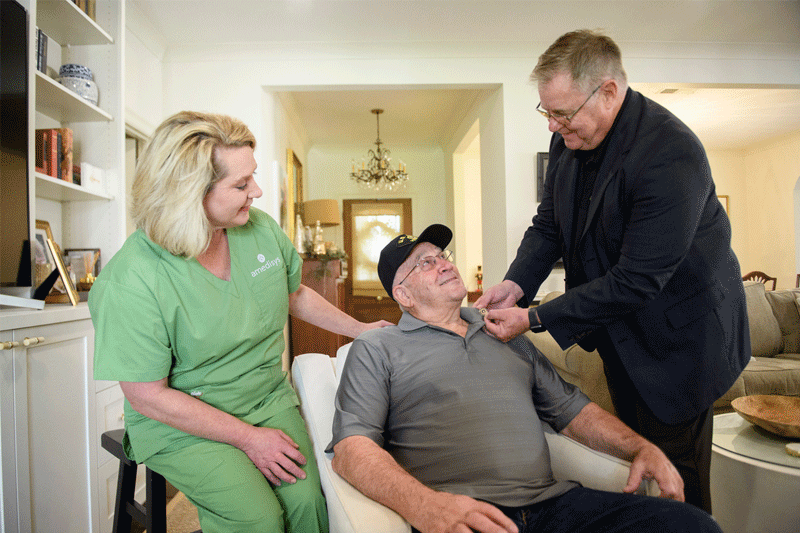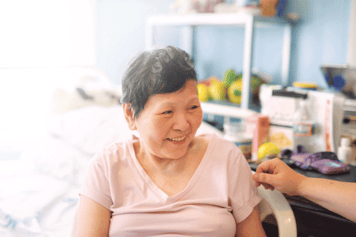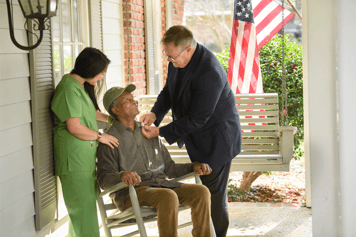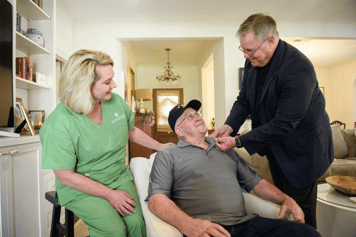Patricia Bushway served in the U.S. Army for 21 years, three years as an enlisted soldier and 18 years as an officer. She was stationed in various places around the world, including Korea, Germany and all over the U.S. Her specialty was military intelligence.
The Role of a Veteran Volunteer in Veterans Hospice
Veteran volunteers play an important role in veterans hospice programs. Given their unique experiences, sacrifices and training, there’s a special bond among veterans. They share a common culture and language.
“When I introduce a veteran hospice patient to a veteran volunteer, within five minutes they don’t even know I’m there,” says Mary Rhoden, an Amedisys hospice volunteer coordinator in Montgomery, AL. “It doesn’t matter if they were in different branches or wars, they have instant connection and camaraderie.”
Some of the hospice care services veteran volunteers provide include:
- Visiting a veteran who is approaching end-of-life
- Helping a veteran understand and apply for veterans’ benefits
- Listening to life stories and reminiscing
- Calling a veteran on hospice care to check in on how they’re doing
- Attending veterans pinning ceremonies or other honors and celebrations
As a veterans hospice volunteer, Patricia spends time with veterans near the end of their lives, as well as some veteran spouses. One of the most rewarding parts of her work is participating in veterans pinning ceremonies, often dressed in full uniform. “I appreciate being able to thank people who deserve our undying appreciation for what they’ve done for us,” she says.
Patricia once had the “amazing opportunity” to participate in a pinning and visit with a D-Day survivor. “We’ve all read about it, studied it and seen it depicted in movies,” she says. “But to sit there and hear him tell his story was such a unique experience. I’ll never forget it.” He showed her his heavy wool Army uniform, still in perfect condition. After he passed away, Patricia helped his daughter donate the uniform to a World War II museum in New Hampshire, creating a lasting legacy.
A Meaningful Experience for Everyone Involved
“I think it’s meaningful for veterans, and I think it matters to the families too,” Patricia says. “They seem very appreciative of somebody recognizing their contribution and listening to their stories. We get talking and remembering things, and they’re able to open up in a different way.”
Patricia believes it isn’t only the veterans and their families who benefit from the services of veterans hospice volunteers. Veteran volunteers gain a lot from the experience too. “People thank me, but I think I get more out of it than anybody does,” she says. “It’s an honor being able to hear firsthand experiences from these people at a crucial time in our history. I would encourage people to take advantage of the opportunity to get to know these people, even if just for a short period of time.”
The appreciation is felt by everyone involved in veterans hospice. Nicole Finitsis, an Amedisys hospice volunteer coordinator in Portsmouth, NH who works with Patricia, says Patricia goes above and beyond in her role and is a highly respected member of the hospice team. “During pinning ceremonies, Patricia will make special note of something unique about the veteran’s service history,” Nicole says. “Whether it is another officer like herself who has dedicated decades to serving their country or a specialist who saw combat time, she makes it a point to honor the veteran with specific accolades and praise, often demonstrating her own humility by pointing out something extraordinary of theirs.”
Veteran volunteers like Patricia are a critical part of showing gratitude for our nation’s heroes and bringing closure to them near the end of their lives.





